What’s it like to attend an iftar in Dubai?
On a recent trip to the Maldives, we had a short stay in Dubai which happened to co-incide with Ramadan, the ninth month of the Islamic calendar during which strict fasting is observed from dawn to sunset. Of course, there are many things you should and shouldn’t do in Dubai simply out of respect, whether it is Ramadan or not, but one other thing you should do – if you’re lucky enough to have the opportunity – is attend an iftar.
 An iftar is the evening meal that Muslims consume after sunset, breaking their daily fast during Ramadan. We attended an iftar in the Al Fahidi District of Dubai, courtesy of the Sheikh Mohammed Centre for Cultural Understanding, a non-profit organisation designed to increase awareness and understanding of the various cultures living in Dubai.
An iftar is the evening meal that Muslims consume after sunset, breaking their daily fast during Ramadan. We attended an iftar in the Al Fahidi District of Dubai, courtesy of the Sheikh Mohammed Centre for Cultural Understanding, a non-profit organisation designed to increase awareness and understanding of the various cultures living in Dubai.
 It’s a great opportunity to learn more about Emirati culture, how families might gather together at the end of the day during Ramadan, and to iron out any misconceptions or misunderstandings, in a relaxed, informal setting. The centre is volunteer-led and strives to remove barriers between people of different nationalities and cultures, raising awareness of the local culture, customs and religion under the slogan of ‘open doors, open minds’.
It’s a great opportunity to learn more about Emirati culture, how families might gather together at the end of the day during Ramadan, and to iron out any misconceptions or misunderstandings, in a relaxed, informal setting. The centre is volunteer-led and strives to remove barriers between people of different nationalities and cultures, raising awareness of the local culture, customs and religion under the slogan of ‘open doors, open minds’.
 The volunteers speak excellent English and, after a short talk, there was a call to prayer, where we could openly observe our hosts praying before the iftar was served.
The volunteers speak excellent English and, after a short talk, there was a call to prayer, where we could openly observe our hosts praying before the iftar was served.
 The food served gives guests a flavour of authentic Emirati cuisine – rice, meat, vegetables, salads, etc. – and during the meal we were able to speak to the volunteers and learn more. They are intelligent, informative and come from a variety of walks of life, yet are all happy to answer any questions you have. (One female volunteer that we spoke to was a medical student with aspirations to become a plastic surgeon.) Consequently, these iftars with the SMCCU have proved extremely popular, and they are particularly special as they offer an authentic experience in a traditional house setting.
The food served gives guests a flavour of authentic Emirati cuisine – rice, meat, vegetables, salads, etc. – and during the meal we were able to speak to the volunteers and learn more. They are intelligent, informative and come from a variety of walks of life, yet are all happy to answer any questions you have. (One female volunteer that we spoke to was a medical student with aspirations to become a plastic surgeon.) Consequently, these iftars with the SMCCU have proved extremely popular, and they are particularly special as they offer an authentic experience in a traditional house setting.


 After the iftar, we visited Diwan Masjid mosque just a short stroll away, where we learnt more from Nasif Kayed, the Emirati cultural ambassador and Director of the SMCCU, a highly engaging and entertaining speaker, who covered everything from how Emirati dress and the background to Ramadan, to the history of religion and the common ground that many religions share. If you get the chance to hear him talk, you should!
After the iftar, we visited Diwan Masjid mosque just a short stroll away, where we learnt more from Nasif Kayed, the Emirati cultural ambassador and Director of the SMCCU, a highly engaging and entertaining speaker, who covered everything from how Emirati dress and the background to Ramadan, to the history of religion and the common ground that many religions share. If you get the chance to hear him talk, you should!
 It was then back to the SMCCU house for dessert and tea which we sadly had to decline as we needed to try to ensure our children got a couple of hours sleep before our flight to the Maldives that night.
There are a number of different iftars you could attend in Dubai during Ramadan – from those put on my hotels and restaurants to smaller, more private family affairs – but I’d highly recommend this experience with SMCCU as a way to learn about traditional iftars, particularly if you’re new to Emirati culture as it’s a great way to further your understanding.
And even if your visit doesn’t happen to co-incide with Ramadan, the centre holds a regular programme of events and activities.
Disclosure: The above formed part of a luxury trip to Dubai and the Maldives sponsored by Hayes & Jarvis, specialists in personalised, luxury holiday itineraries for discerning travellers to over 55 destinations worldwide.
It was then back to the SMCCU house for dessert and tea which we sadly had to decline as we needed to try to ensure our children got a couple of hours sleep before our flight to the Maldives that night.
There are a number of different iftars you could attend in Dubai during Ramadan – from those put on my hotels and restaurants to smaller, more private family affairs – but I’d highly recommend this experience with SMCCU as a way to learn about traditional iftars, particularly if you’re new to Emirati culture as it’s a great way to further your understanding.
And even if your visit doesn’t happen to co-incide with Ramadan, the centre holds a regular programme of events and activities.
Disclosure: The above formed part of a luxury trip to Dubai and the Maldives sponsored by Hayes & Jarvis, specialists in personalised, luxury holiday itineraries for discerning travellers to over 55 destinations worldwide.
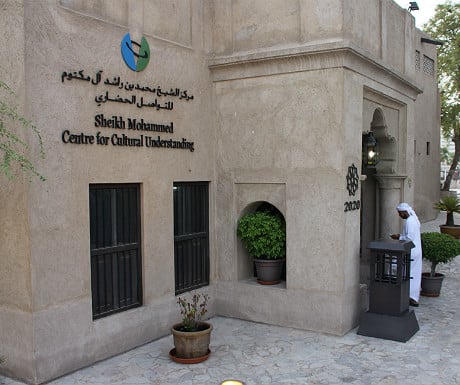 An iftar is the evening meal that Muslims consume after sunset, breaking their daily fast during Ramadan. We attended an iftar in the Al Fahidi District of Dubai, courtesy of the Sheikh Mohammed Centre for Cultural Understanding, a non-profit organisation designed to increase awareness and understanding of the various cultures living in Dubai.
An iftar is the evening meal that Muslims consume after sunset, breaking their daily fast during Ramadan. We attended an iftar in the Al Fahidi District of Dubai, courtesy of the Sheikh Mohammed Centre for Cultural Understanding, a non-profit organisation designed to increase awareness and understanding of the various cultures living in Dubai.
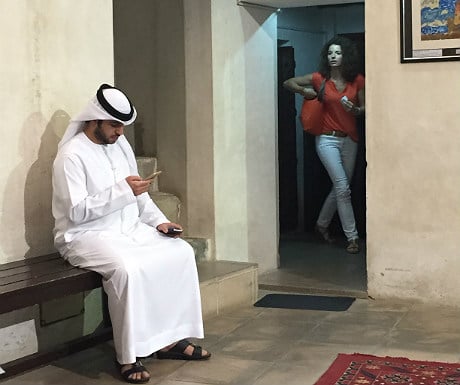 It’s a great opportunity to learn more about Emirati culture, how families might gather together at the end of the day during Ramadan, and to iron out any misconceptions or misunderstandings, in a relaxed, informal setting. The centre is volunteer-led and strives to remove barriers between people of different nationalities and cultures, raising awareness of the local culture, customs and religion under the slogan of ‘open doors, open minds’.
It’s a great opportunity to learn more about Emirati culture, how families might gather together at the end of the day during Ramadan, and to iron out any misconceptions or misunderstandings, in a relaxed, informal setting. The centre is volunteer-led and strives to remove barriers between people of different nationalities and cultures, raising awareness of the local culture, customs and religion under the slogan of ‘open doors, open minds’.
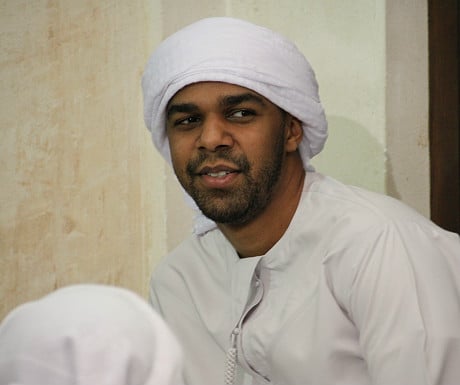 The volunteers speak excellent English and, after a short talk, there was a call to prayer, where we could openly observe our hosts praying before the iftar was served.
The volunteers speak excellent English and, after a short talk, there was a call to prayer, where we could openly observe our hosts praying before the iftar was served.
 The food served gives guests a flavour of authentic Emirati cuisine – rice, meat, vegetables, salads, etc. – and during the meal we were able to speak to the volunteers and learn more. They are intelligent, informative and come from a variety of walks of life, yet are all happy to answer any questions you have. (One female volunteer that we spoke to was a medical student with aspirations to become a plastic surgeon.) Consequently, these iftars with the SMCCU have proved extremely popular, and they are particularly special as they offer an authentic experience in a traditional house setting.
The food served gives guests a flavour of authentic Emirati cuisine – rice, meat, vegetables, salads, etc. – and during the meal we were able to speak to the volunteers and learn more. They are intelligent, informative and come from a variety of walks of life, yet are all happy to answer any questions you have. (One female volunteer that we spoke to was a medical student with aspirations to become a plastic surgeon.) Consequently, these iftars with the SMCCU have proved extremely popular, and they are particularly special as they offer an authentic experience in a traditional house setting.
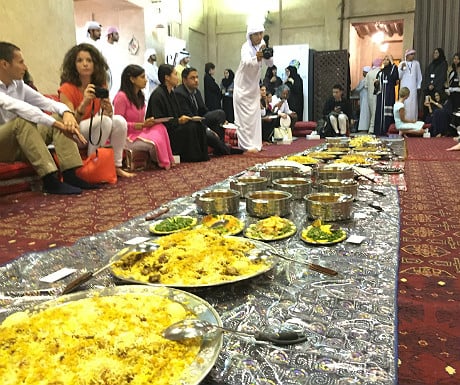
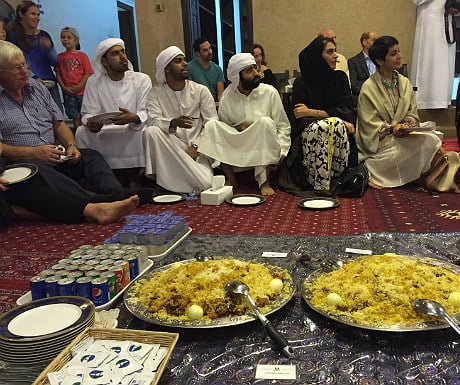
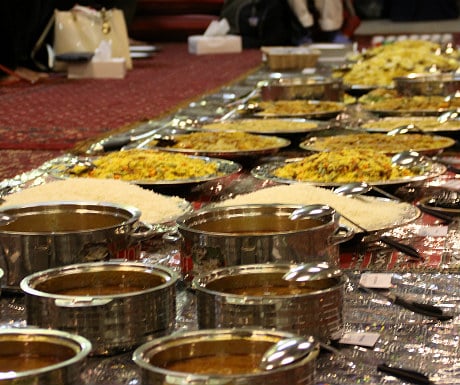 After the iftar, we visited Diwan Masjid mosque just a short stroll away, where we learnt more from Nasif Kayed, the Emirati cultural ambassador and Director of the SMCCU, a highly engaging and entertaining speaker, who covered everything from how Emirati dress and the background to Ramadan, to the history of religion and the common ground that many religions share. If you get the chance to hear him talk, you should!
After the iftar, we visited Diwan Masjid mosque just a short stroll away, where we learnt more from Nasif Kayed, the Emirati cultural ambassador and Director of the SMCCU, a highly engaging and entertaining speaker, who covered everything from how Emirati dress and the background to Ramadan, to the history of religion and the common ground that many religions share. If you get the chance to hear him talk, you should!
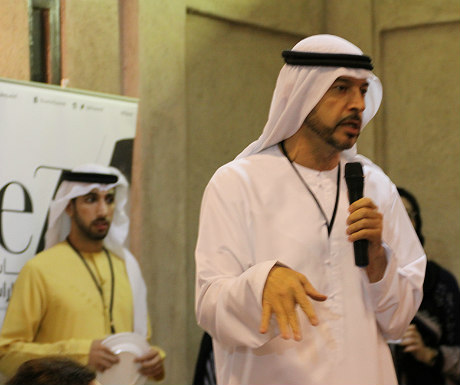 It was then back to the SMCCU house for dessert and tea which we sadly had to decline as we needed to try to ensure our children got a couple of hours sleep before our flight to the Maldives that night.
There are a number of different iftars you could attend in Dubai during Ramadan – from those put on my hotels and restaurants to smaller, more private family affairs – but I’d highly recommend this experience with SMCCU as a way to learn about traditional iftars, particularly if you’re new to Emirati culture as it’s a great way to further your understanding.
And even if your visit doesn’t happen to co-incide with Ramadan, the centre holds a regular programme of events and activities.
Disclosure: The above formed part of a luxury trip to Dubai and the Maldives sponsored by Hayes & Jarvis, specialists in personalised, luxury holiday itineraries for discerning travellers to over 55 destinations worldwide.
It was then back to the SMCCU house for dessert and tea which we sadly had to decline as we needed to try to ensure our children got a couple of hours sleep before our flight to the Maldives that night.
There are a number of different iftars you could attend in Dubai during Ramadan – from those put on my hotels and restaurants to smaller, more private family affairs – but I’d highly recommend this experience with SMCCU as a way to learn about traditional iftars, particularly if you’re new to Emirati culture as it’s a great way to further your understanding.
And even if your visit doesn’t happen to co-incide with Ramadan, the centre holds a regular programme of events and activities.
Disclosure: The above formed part of a luxury trip to Dubai and the Maldives sponsored by Hayes & Jarvis, specialists in personalised, luxury holiday itineraries for discerning travellers to over 55 destinations worldwide.Did you enjoy this article?
Receive similar content direct to your inbox.


Great article, very informative. I always wanted to know what happens during Ramadan. It’s amazing that you can get into such religious moments as a tourist. :)
I was very interested to read this article. I have been lucky enough to visit Oman during Ramadan and to experience iftar as a guest of a local family. Oman is much stricter in observing Islamic rules than Dubai (which I have also visited)but iftar and the dishes served are incredible in both countries.Thanks for your take and details of the volunteer organisation.
I agree with how this article is very informative. Not a lot of outsiders get to know what happens during these religious celebrations and rituals. It is nice for a tourist to know these things beforehand to better prepare for it.
I think I could cope with not eating all day, but the idea of not drinking in the Dubai heat I think I would find really tough!